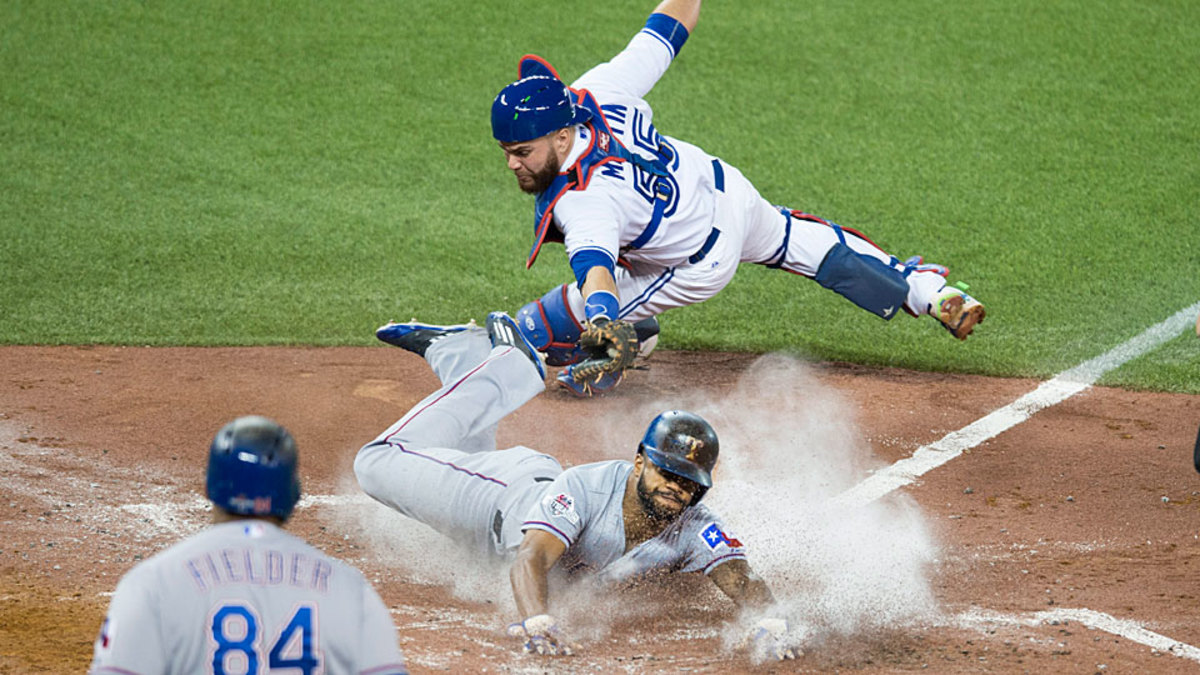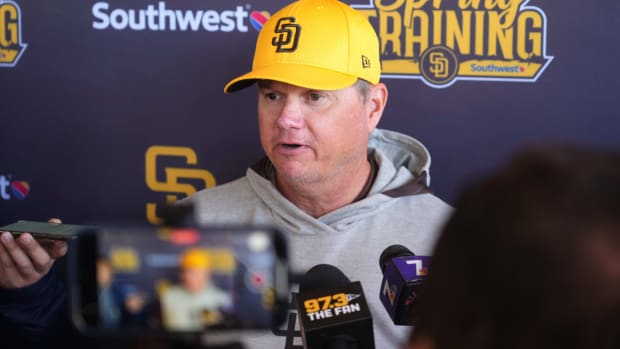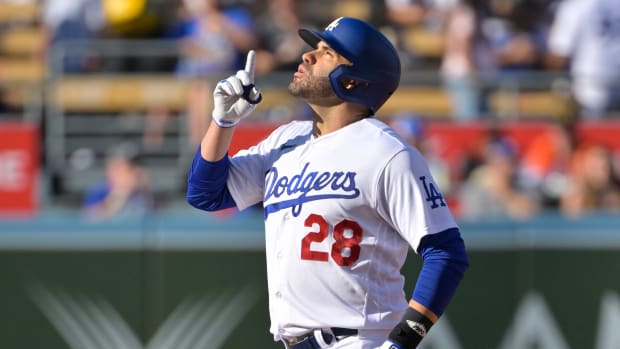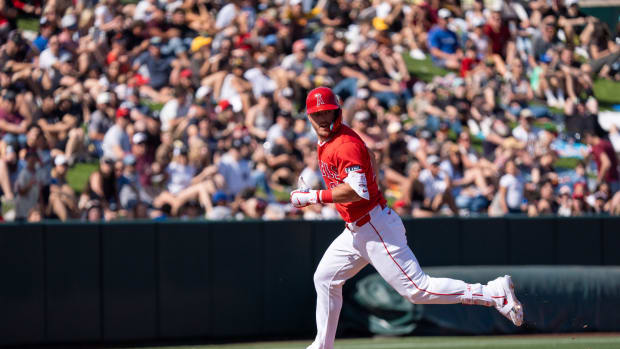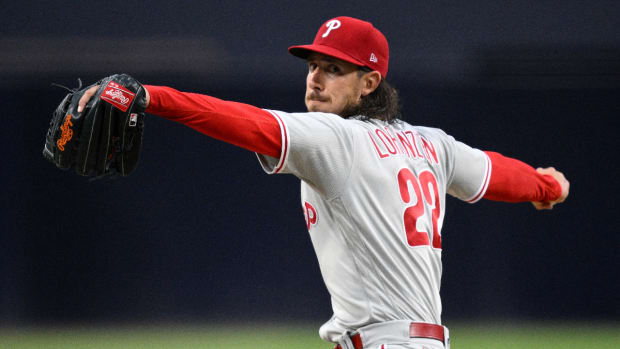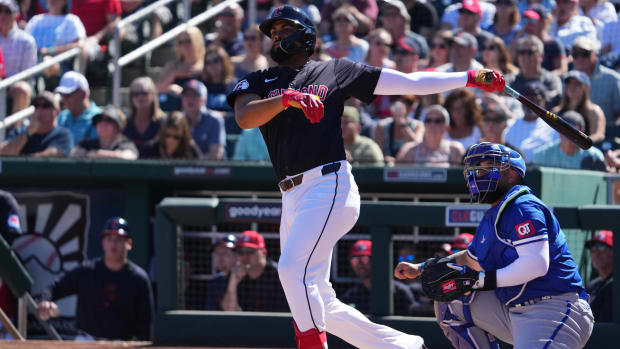Three Strikes: Home field proves no advantage; Kershaw tries again; more
Remember all that worrying we did down the stretch about home-field advantage? Uh, scratch that.
The home field advantage in baseball, which never has been that strong, has become almost irrelevant over the past two postseasons. With the Rangers and Astros winning their respective ALDS openers on the road Thursday, the home teams have started a postseason 0–4 for the first time in 45 years. Dating to last year, home teams are 18–20, and the team with home field advantage has lost nine of the 11 postseason matchups (series and wild-card games). Going back to 1995, the start of the wild-card era, home teams are 357–306 in the postseason, a 53.8% success rate.
Rangers spoil Blue Jays’ postseason return with win in Game 1 of ALDS
The Blue Jays—with their enclosed dome, thick turf and madhouse crowd—were supposed to have the biggest home field advantage in the postseason. The Royals, with their own baseball-crazed fan base, were supposed to have a big edge over a young Houston team. Both Toronto and Kansas City faltered in Game 1.
What’s going on? This postseason has been less about where the game is played and more about who scores first—and how hard it is to score last. Teams that score first so far are 4–0, and in every case, they have posted a run early; the winning team scored first no later than the third inning. Coming from behind has rarely been harder in baseball thanks to the rise of specialized pitching. Now combine that regular-season trend with the October off days that provide for full, fresh bullpens, and action in these playoff games has come to a screeching halt when relievers take over.
After these first four games, bullpens have posted a 1.33 ERA. Hitters are batting just .144 against relievers.
I’m sure one of these days some team is going to mount a comeback. And when it happens, with the kind of stuff relievers are slinging, maybe we should be amazed that it happened at all.
2. Key for Kershaw
Matt Harvey gets ball for the Mets in NLDS Game 3, a healthy pitcher limited to one start in the series as a precautionary measure, and entrusted with putting to rest the drama about his innings and punctuality.
Astros ride familiar formula past reeling Royals in Game 1 of ALDS
The Tournament of Aces is chock full of starting pitchers with pressure beyond the normal responsibility of coming through for their teams in a playoff game. But no one enters into this postseason with more pressure to perform well than Clayton Kershaw, who starts Game 1 for the Dodgers tonight against the Mets.
Kershaw is one of only eight pitchers to get eight postseason starts and come away with no more than one win: He is 1–5 with a 5.12 ERA in 11 overall playoff appearances. It is the only smudge on his resume that includes three NL Cy Young awards and an MVP.
The key tonight when you watch Kershaw is what he does when he gets in trouble. In his past three postseason starts, Kershaw has allowed two three-run innings, a four-run inning and a seven-run inning. He has let innings get away from him, appearing to let his intense competitive streak get the better of him. So watch him when the Mets put together a threat. Does he work faster? Does he try to bully his way out of trouble by relying more on his fastball? Or does he continue to use all of his pitches and locate better instead of just throwing harder.
When Kershaw does pitch a postseason gem, the surprise will not be that he did so, but that he pitched below his usual level of excellence so many times before in October. That gem may come as soon as tonight at Dodger Stadium.
• Postseason schedule, TV listings, recaps | SI's Division Series picks
3. Lessons from Leyland
Jim Leyland managed his last game in 2013, but from afar he has some fingerprints on this postseason. Before John Gibbons of Toronto managed his first postseason game Thursday, he placed a call to Leyland, an old friend.
“He told me, ‘Don’t get too conservative, because some guys get that point and are afraid to make a move,’” Gibbons said. “And he also said, ‘Get ready to take the heat if it arises.”
Mets manager Terry Collins, a former coach on Leyland’s staff in Pittsburgh, also placed a call to Leyland. And Jeff Banister of the Rangers—yes, also managing in his first postseason—played for Leyland in Pittsburgh, and though he had not yet spoken with him before ALDS Game 1, he said the lessons he learned from Leyland and Chuck Tanner, another former Pirates manager, stay with him.
“I draw from the experience of others all along the way,” Banister said.
In 22 seasons managing the Pirates, Marlins, Rockies and Tigers, Leyland took clubs to the playoffs eight times and made three trips to the World Series, winning it all with the 1997 Marlins. If his voice resonates in this postseason, it’s because the dugouts are full of managers in unchartered waters looking for navigational help.
In fact, it's guaranteed that somebody will win his first World Series as manager. Among the eight still working, four are managing in the postseason for the first time (Gibbons, Banister, Collins and the Astros' A.J. Hinch), another never has reached the Fall Classic (the Dodgers' Don Mattingly) and three have lost a World Series (the Cardinals' Mike Matheny, the Cubs' Joe Maddon and the Royals' Ned Yost.)
And remember this about this new generation of managers: No manager has won the World Series on his first job since Ozzie Guillen of the White Sox in 2005. We have three contenders to end that streak: Banister, Matheny and Mattingly.






























